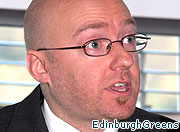A Scottish secularist pressure group has called on the Government to remove religious representatives from education committees, during a session in Holyrood today.
But the Kirk has criticised the move, saying it was the Church of Scotland which helped to establish universal education, and that its representatives play a supportive role.
The Edinburgh Secular Society (ESS) wants to see a change to the law, because under the Local Government Act 1973 local authority education committees are required to appoint three representatives from religious organisations.
Opposition
These appointees – which should include one from the Church of Scotland, one from the Roman Catholic Church and a third from any other religious organisation – each have votes equal to elected councillors.
The ESS gave evidence to the Scottish Parliament’s Public Petitions Committee, having gathered 1,778 signatures in opposition to the current legislation.
The campaign is supported by Green MSP Patrick Harvie, SNP councillor Sandy Howat and other secular groups.
Influence
Mr Harvie said: “In a society in which increasing numbers of people don’t practice any religion, it’s high time that we questioned a practice which gives religious hierarchies an influence over every child’s education.”
But a Church of Scotland spokesman said the role the Kirk’s representatives play is “one of service and support that reflects its contribution to education since its vision of a school in every parish helped in establishing Scotland’s universal education system, one of the first anywhere in the world, and profoundly shaped the Scotland we know today”.
And a spokesman for the Roman Catholic Church said: “Church representatives offer an invaluable service to their local communities by contributing to discussions among elected representatives on councils.”
Demand
The Herald newspaper reported that the Scottish Government said there are no plans to change the existing legislation.
The Scottish Secular Society (SSS) came under fire last year after it wrote a letter to every school in Scotland demanding information about their chaplaincy services.
The letter asked 24 questions, including whether material disagreeing with homosexuality had been distributed in the school.
The Christian Institute urged schools not to be intimidated by the ‘hostile’ Freedom of Information (FOI) request, and reminded schools that it is lawful for them to invite in religious groups.

